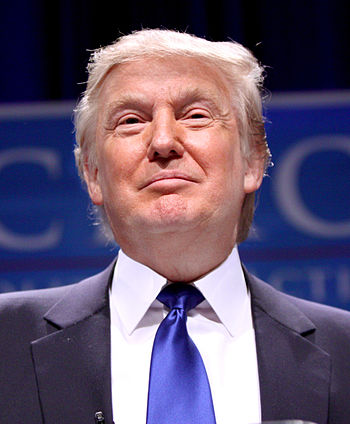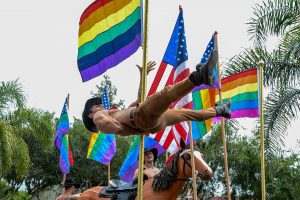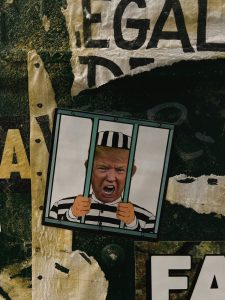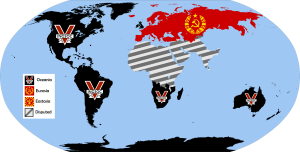The president is revising the dictionary of the English language! Though he’s a man with three adjectives, two pronouns and few verbs, he’s made considerable headway in a daunting project. Usually, he simply reverses the meaning of a word, a phrase, or an entire sentence. Lately, he’s ending most of his speeches with “Believe me”, repeating it at least twice, apparently unaware that believing him is an impossibility that automatically doubles itself, turning into an even bigger lie. Just in those words, he’s wasted one of his two pronouns. Until now, the other one was always “I”, but “I” has now become the Royal “we”, hinting at agreement with another person or group; a connection he doesn’t actually have. “Believe me” means its precise opposite; a heads-up to another flagrant lie.
Trump began the dictionary project by making “great” the G word, the one no longer uttered by the “elite”, because the definition of “elite” itself has been drastically altered. Long ago, the term “elite” referred to those who had risen to the height of a meritocracy. America used to be one of those meritocracies, but that was back when elite always indicated a worthwhile achievement; the pinnacle of a profession, a significant honor, a high office. There were many routes to becoming elite and they all implied something beneficial. Who wants to be elite now?
“Little” was always a standard way to describe something small; a child, an amount of time, really just about anything not oversized. It wasn’t the most imaginative adjective, but certainly useful. The Trump definition is derogative. Even spelled correctly, Trump made “little” demeaning and disrespectful. Deliberately (or maybe not) misspelled as “liddle”, it’s currently a uniquely nasty insult. He’s even ruined “beautiful” by applying it to projects either non-existent, undesirable, or downright senseless, like a health plan, a wall on the southern border of the United States, or corporate tax cuts. What now looks beautiful in Trumpspeak?
Take a word like “optics”. Originally, a term used for the scientific study of light or transmission and deflection of radiation, it’s now become “the way in which a course of action is perceived by the public”. That definition is limited to North American usage. The rest of the world leaves it alone. Trump has reduced “optics” to a word marking his appearances on TV; a mere photo-op. A Trump “promise” is not something to keep, but something to break; verified empirical truth has become “false news”. Thriving, as the New York Times has done within the last year, means “failing’ in the Trump-revised dictionary.
He loves clichés and pads his tweets with them. “Thoughts and prayers” are his chosen gift to despairing refugees, victims of massacres, Gold Star families and the millions who have lost everything to hurricanes, floods and fires. “Wait and see” is another pet Trump phrase, repeated the customary twice. It doesn’t refer to hoped-for birthday or Christmas presents, but another impending administrative disaster.
Does the president fully realize that one of his pet threats, ““Fire and Fury never seen before” connotes a nuclear war? Is he aware that Hiroshima and Nagasaki aren’t varieties of sushi, but ways to destroy the world? Does he still think the Environment Protection Agency is just bad weather?
He appointed Kathleen Hartnett White to that agency, a woman who believes that carbon dioxide is wholesome. Does that appointee know that thousands of Americans unintentionally die each year from carbon dioxide poisoning and not all of them are committing suicide in their garages? Suicide is a separate statistic.
All is not lost because Trump has actually enlarged our vocabularies in another valuable direction. Words Americans may have forgotten from college courses in Sociology or Psychology 101 and 102 are now readily accessible to everyone in the authoritative new book; The Dangerous Case of Donald Trump by Bandy Lee. An anthology of essays by psychiatrists, psychologists, sociologists and other specialists in human behavior, the list defines a sociopath as someone “revenge oriented, exhibiting grandiosity, lacking empathy, failure to accept consequences of his own acts, sense of superiority without commensurate achievements, sexual promiscuity, blatant lying, impulsive and compulsive acts, sense of entitlement, paranoia, delusion and aberrant behavior. Reading on, we find “malignant narcissism”, surely the worst in the long list of personality disorders.
Hardly cheering is the news that “Schizophrenia has a lower rating of harm to others than personality disorder, which is more strongly associated with violence than any other risk factor studied by the Hare Psychopathic Check List”. Oh.






Be First to Comment